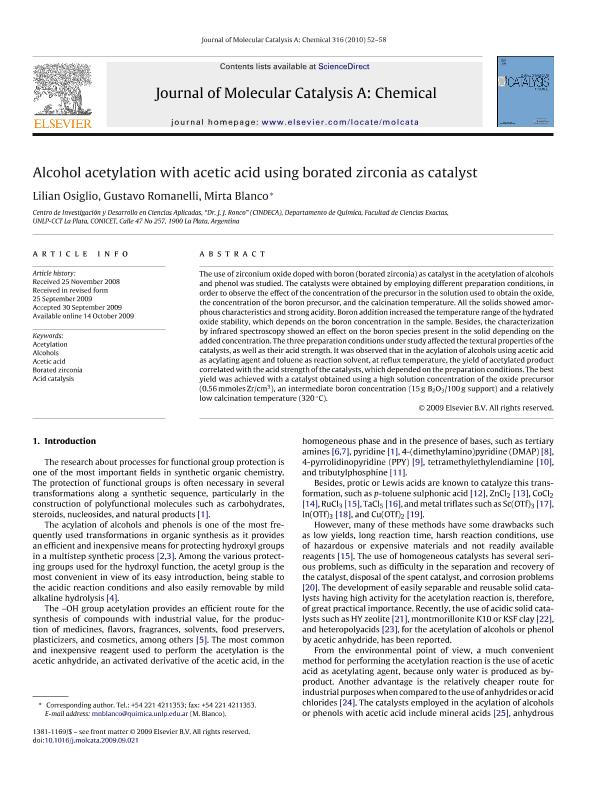Mostrar el registro sencillo del ítem
dc.contributor.author
Blanco, Mirta Noemi

dc.contributor.author
Osiglio, Lilian

dc.contributor.author
Romanelli, Gustavo Pablo

dc.date.available
2015-12-17T18:54:02Z
dc.date.issued
2009-10-14
dc.identifier.citation
Blanco, Mirta Noemi; Osiglio, Lilian; Romanelli, Gustavo Pablo; Alcohol acetylation with acetic acid using borated zirconia as catalyst; Elsevier Science; Journal of Molecular Catalysis A: Chemical; 316; 1-2; 14-10-2009; 52-58
dc.identifier.issn
1381-1169
dc.identifier.uri
http://hdl.handle.net/11336/3020
dc.description.abstract
The use of zirconium oxide doped with boron (borated zirconia) as catalyst in the acetylation of alcohols and phenol was studied. The catalysts were obtained by employing different preparation conditions, in order to observe the effect of the concentration of the precursor in the solution used to obtain the oxide, the concentration of the boron precursor, and the calcination temperature. All the solids showed amorphous characteristics and strong acidity. Boron addition increased the temperature range of the hydrated oxide stability, which depends on the boron concentration in the sample. Besides, the characterization by infrared spectroscopy showed an effect on the boron species present in the solid depending on the added concentration. The three preparation conditions under study affected the textural properties of the catalysts, as well as their acid strength. It was observed that in the acylation of alcohols using acetic acid as acylating agent and toluene as reaction solvent, at reflux temperature, the yield of acetylated product correlated with the acid strength of the catalysts, which depended on the preparation conditions. The best yield was achieved with a catalyst obtained using a high solution concentration of the oxide precursor (0.56 mmoles Zr/cm3), an intermediate boron concentration (15 g B2O3/100 g support) and a relatively low calcination temperature (320 °C).
dc.format
application/pdf
dc.language.iso
eng
dc.publisher
Elsevier Science

dc.rights
info:eu-repo/semantics/openAccess
dc.rights.uri
https://creativecommons.org/licenses/by-nc-nd/2.5/ar/
dc.subject
Acetylation
dc.subject
Alcohols
dc.subject
Acetic Acid
dc.subject
Borated Zirconia
dc.subject.classification
Ingeniería de Procesos Químicos

dc.subject.classification
Ingeniería Química

dc.subject.classification
INGENIERÍAS Y TECNOLOGÍAS

dc.title
Alcohol acetylation with acetic acid using borated zirconia as catalyst
dc.type
info:eu-repo/semantics/article
dc.type
info:ar-repo/semantics/artículo
dc.type
info:eu-repo/semantics/publishedVersion
dc.date.updated
2016-03-30 10:35:44.97925-03
dc.journal.volume
316
dc.journal.number
1-2
dc.journal.pagination
52-58
dc.journal.pais
Países Bajos

dc.journal.ciudad
Amsterdam
dc.description.fil
Fil: Blanco, Mirta Noemi. Consejo Nacional de Investigaciones Científicas y Técnicas. Centro Científico Tecnológico La Plata. Centro de Investigación y Desarrollo en Ciencias Aplicadas; Argentina. Universidad Nacional de la Plata. Facultad de Ciencias Exactas. Departamento de Quimica; Argentina
dc.description.fil
Fil: Osiglio, Lilian. Consejo Nacional de Investigaciones Científicas y Técnicas. Centro Científico Tecnológico La Plata. Centro de Investigación y Desarrollo en Ciencias Aplicadas; Argentina. Universidad Nacional de la Plata. Facultad de Ciencias Exactas. Departamento de Quimica; Argentina
dc.description.fil
Fil: Romanelli, Gustavo Pablo. Consejo Nacional de Investigaciones Científicas y Técnicas. Centro Científico Tecnológico La Plata. Centro de Investigación y Desarrollo en Ciencias Aplicadas; Argentina. Universidad Nacional de la Plata. Facultad de Ciencias Exactas. Departamento de Quimica; Argentina
dc.journal.title
Journal of Molecular Catalysis A: Chemical

dc.relation.alternativeid
info:eu-repo/semantics/altIdentifier/url/https://www.sciencedirect.com/science/article/pii/S1381116909004695#!
dc.relation.alternativeid
info:eu-repo/semantics/altIdentifier/doi/https://doi.org/10.1016/j.molcata.2009.09.021
Archivos asociados
